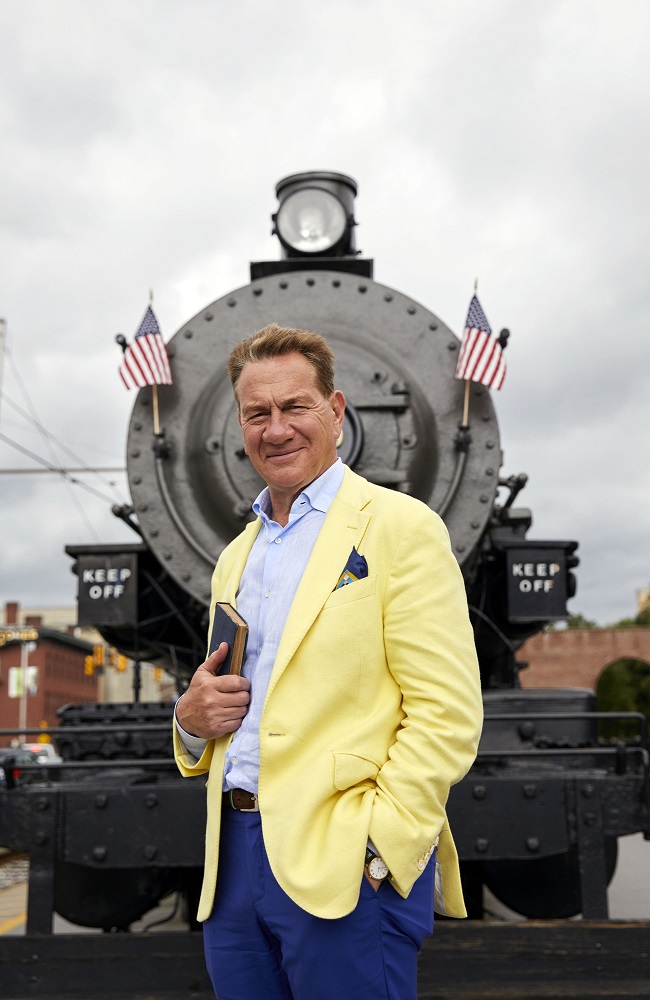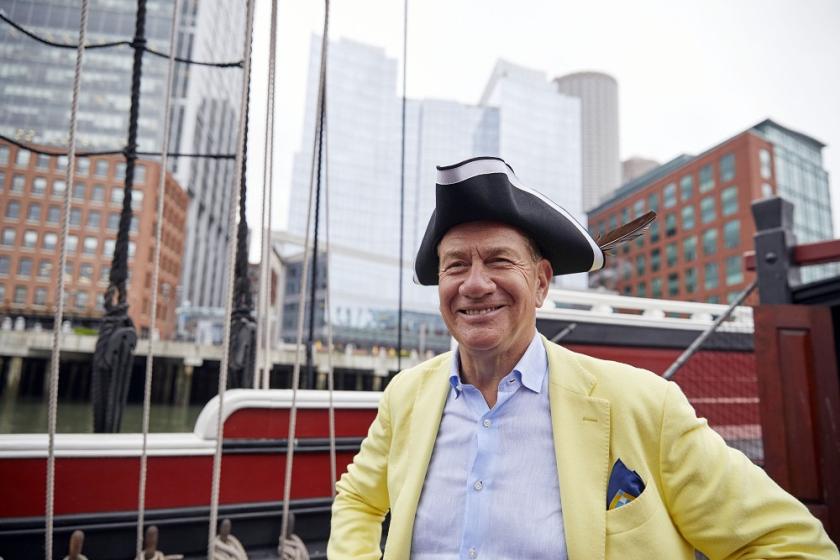Michael Portillo has barely been off a train since leaving politics, taking journeys blending scenery and history: it must be a relief receiving plaudits for edutainment instead of the abuse habitually heaped on politicians.
Herewith the third American series, around the East Coast, its history perhaps intentionally a subtle rebuke to Trumpian values. Ten hours of film divided into 20 programmes detail an 1,100 mile journey from Boston to Toronto. Long-distance American railroad journeys in the 21st century are an odd enterprise: once a country where great fortunes were made by the railway barons, connecting the country by magnificent feats of engineering, today the USA has a commuter network, especially on the east and west coast, but long distance has been minimised dramatically and may be considered an expensive luxury.
There was a gently naff re-enactment of the protest against George III and taxation without representation
In transatlantic mode Portillo himself was now completely colourful with a wardrobe of jackets and trousers in brilliant colours: he especially fancied a buttercup yellow jacket. His own starting-off point was the 19th century Appleton’s guidebook to American and Canada, and he provided a series of painless history lessons.
His journey will take us from New England to the Great Lakes, starting in Boston, founded in 1630 by the Puritans and named after their hometown in Lincolnshire. It was to become, with a combination of intellectuals and hotheads, the cradle of the American Revolution: Portillo suggested in a casual conclusion to this first installment that just as the American Revolution had inspired the French, what happened in Boston was also the beginning of modern Europe, and the beginning of the end of the British Empire.
Come 1773 and the Boston Tea Party, that protest against increased British taxation to support the expensive war against the French in Canada. There was a gently naff re-enactment of the protest against George III and taxation without representation (especially ironic in the 21st century, as the US is one of only two countries in the world that taxes its citizens worldwide, effectively taxation without representation). Over 340 containers of East India tea came into Boston on three ships with an extra tax to be paid on each unit. Daniel Adams roused a crowd of 2,000 spectators and protesters, and some £1.5 million (at today’s prices) worth of tea was thrown overboard; the so-called Incident on Griffin’s Wharf became known at the Boston Tea Party in the 1830s. This illegal act of vandalism began the road to revolution. Portillo (main picture) gamely participated in the re-enactment, before adjourning for sustenance on to the Union Oyster Bar, the oldest restaurant in Boston (and the oldest one in continuous use in the whole of the US).
 From there on by commuter rail to visit Lowell, 26 miles from Boston, the birthplace of the American Industrial Revolution, planned as a factory town. On a Lowell street car, Portillo headed to the Boott Cotton Mills, opened 1835, closed 1955, and now part of industrial heritage, its history a museum. The whole process of producing cotton cloth was contained within the one factory, as Emily the Park Ranger guided Michael round the huge factory, which in its heyday would have been almost unbearably noisy, hot and humid. Francis Cabot Lowell its founder travelled to see the processes pioneered in England. He was said to have memorised the plans for the power looms he saw in Britain and in an inspired act of industrial espionage brought the methods back to Massachusetts.
From there on by commuter rail to visit Lowell, 26 miles from Boston, the birthplace of the American Industrial Revolution, planned as a factory town. On a Lowell street car, Portillo headed to the Boott Cotton Mills, opened 1835, closed 1955, and now part of industrial heritage, its history a museum. The whole process of producing cotton cloth was contained within the one factory, as Emily the Park Ranger guided Michael round the huge factory, which in its heyday would have been almost unbearably noisy, hot and humid. Francis Cabot Lowell its founder travelled to see the processes pioneered in England. He was said to have memorised the plans for the power looms he saw in Britain and in an inspired act of industrial espionage brought the methods back to Massachusetts.
Onward in this continuing curious potpourri to see the second largest organ in the world at Haverhill, near Boston, to the Methuen Memorial Music Hall where members of the Haydn and Handel Choir, founded in 1810, sang for our peripatetic interlocutor. The Music Hall was built to house the vast instrument, built in Germany for the very first concert hall in the US. Cue a rendering of The Battle Hymn of the Republic, organ playing too; its words were written by Julia Ward Howe in the 1861 during the American Civil War, herself a member of choir.
The whole was an animated browse through a kind of visual Wikipedia, lots of awe, surprise, wonderment, enthusiasm and masses of facts and dates, but hardly a train in sight as Portillo and his audience bounced from sight to site (a train, at last: Portillo finds a Heritage locomotive at Lowell, pictured above). The menu is à la carte, the dishes a very curious mixture: an essay in short bursts of vivid imagery, hardly analytical, but something perhaps to whet the appetite for more. And there will be much, much more.















Add comment